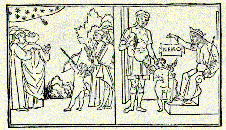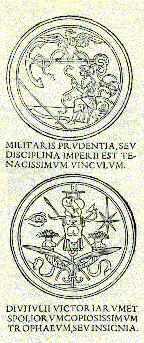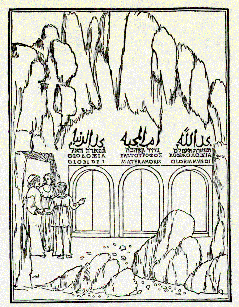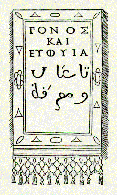Introduction
Typography
- Fonts
- Text and image
- Technopaegnia
Woodcuts
Cinematic visual logic
- Moving bodies
- Double page spread
- Filmic sequences
Architecture
Gardens and landscapes
Other editions
Mysterious messages
Eros and metaphor
Technical innovations
External links
Mysterious messages
The Hypnerotomachia Poliphili is one of the most unreadable books ever published. The first inkling of difficulty occurs at the moment one picks up the book and tries to utter its tongue-twisting, practically unpronounceable title. The difficulty only heightens as one flips through the pages and tries to decipher the strange, baffling, inscrutable prose, replete with recondite references, teeming with tortuous terminology, choked with pulsating, prolix, plethoric passages. Now in Tuscan, now in Latin, now in Greek –elsewhere in Hebrew, Arabic, Chaldean and hieroglyphs – the author has created a pandemonium of unruly sentences that demand the unrelenting skills of a prodigiously endowed polyglot in order to be understood. One of the woodcuts the reader comes across early in the book is of an unbridled winged steed, charging headlong at full gallop, ears drawn back, head twisted sideways, bucking the unlucky riders who try in vain to cling to its back and mane. The image might serve as an emblem for the whole work. At times even the most devoted reader cannot help feeling bewildered when looking down in this frenetic, fantastic specimen of whirling linguistic furore, hurling great semantic dust clouds into the air as it kicks and reels and pitches along on its impetuous course" (p. 80) …. As if the text were not difficult enough, the accompanying illustrations themselves are cryptic and enigmatic (p. 91). (from L. Lefaivre’s Leon Battista Alberti’s Hypnerotomachia Poliphili). Copyright © 1997. The MIT Press. All rights reserved.
Mysterious
messages in:

Latin

Latin and hieroglyphs

Greek

Arabic, Hebrew, Greek and Latin

Greek and Arabic

Hieroglyphs